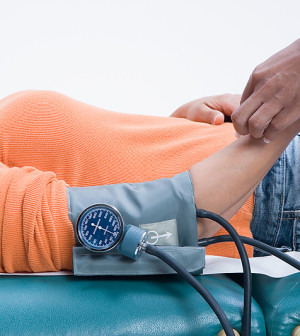- Double Mastectomy May Offer No Survival Benefit to Women With Breast Cancer
- Toxic Lead Found in Cinnamon Product, FDA Says
- Certain Abbott Blood Sugar Monitors May Give Incorrect Readings
- Athletes Can Expect High Ozone, Pollen Counts for Paris Olympics
- Fake Oxycontin Pills Widespread and Potentially Deadly: Report
- Shingles Vaccine Could Lower Dementia Risk
- Your Odds for Accidental Gun Death Rise Greatly in Certain States
- Kids From Poorer Families Less Likely to Survive Cancer
- Tough Workouts Won’t Trigger Cardiac Arrest in Folks With Long QT Syndrome
- At-Home Colon Cancer Test Can Save Lives
Needle-Free ‘Breathalyzer’ for Daily Diabetes Testing Shows Promise


WEDNESDAY, Nov. 13 People with diabetes have to prick their fingers multiple times a day to monitor their blood sugar levels, but researchers report that someday patients may be able to do that simply by checking their breath.
A hand-held device would measure levels of the chemical acetone in someone’s breath. Acetone levels rise when blood sugar levels rise, and acetone is responsible for the sweet, fruity smell on the breath of people with diabetes who have high blood sugar levels.
What hasn’t yet been proven is whether or not blood sugar levels reliably rise and fall with acetone levels, according to the study’s lead researcher, Ronny Priefer, a professor of medicinal chemistry at Western New England University in Springfield, Mass.
“If we can successfully show that there is a linear correlation between acetone levels and blood glucose [sugar] levels, the ease of which an individual with diabetes can monitor their disease state should be dramatically simplified,” Priefer said.
He added that a simple breath test to measure blood sugar levels might help patients better manage their disease, too, because it won’t hurt like a finger prick to get the information needed to guide treatment decisions.
Results of the study were scheduled to be presented Wednesday at the annual meeting of the American Association of Pharmaceutical Scientists, held in San Antonio, Texas.
People with either type 1 or type 2 diabetes have to measure their blood sugar levels to monitor how well treatments are working. Blood sugar checks are especially important for people with type 1 diabetes, an autoimmune disease that always requires treatment with insulin. People with type 1 diabetes may check their blood sugar levels as many as six or more times a day, according to JDRF (formerly the Juvenile Diabetes Research Foundation).
People with type 2 diabetes who use insulin also need to check their blood sugar levels more frequently than those who don’t use insulin. For those dependent on insulin, a blood sugar check tells them whether or not they need more insulin, and helps guide the decision on how much insulin is needed.
Priefer and his colleagues developed a hand-held device that uses layers of a film that react with acetone to quantify the amount of acetone present in breath samples.
Right now, the breathalyzer is about the size of a book. The researchers are working to make the device smaller, so that it’s similar to what’s used by the police to measure blood alcohol levels. Priefer said that would make it about the size of a large coffee mug.
He said they have two clinical trials planned for 2014 to see if the levels of acetone go up linearly with a rise in blood sugar levels.
Priefer said he expects that the researchers will find that certain foods may affect the readings. And, of course, the presence of acetone in the environment would affect readings. So, if someone had just removed nail polish with an acetone-based remover, that would affect the readings.
“The ultimate goal is to replace the finger prick,” he said. However, he said it remains to be seen whether the blood sugar measurements will be accurate enough to guide insulin dosing, or if the technology might just be useful for people with type 2 diabetes who don’t use insulin.
One diabetes expert said he was glad to see treatment innovations but didn’t think this one would be appropriate for all patients.
“I’m happy to learn that there are novel things in technology in development. But, the relationship between acetone and blood sugar isn’t always one to one,” said Dr. Joel Zonszein, director of the clinical diabetes center at Montefiore Medical Center, in New York City.
“People can have high blood sugars with low acetone, and low blood sugars with high acetone,” Zonszein said. “I don’t think acetone will be a good way of managing blood sugars, at least not for people with type 1 diabetes, where they really need very precise numbers to know how much insulin to give. It may be a help for people with type 2 diabetes, who aren’t taking insulin.”
More information
Learn more about methods to check blood sugar from the American Diabetes Association.
Source: HealthDay
Copyright © 2024 HealthDay. All rights reserved.










